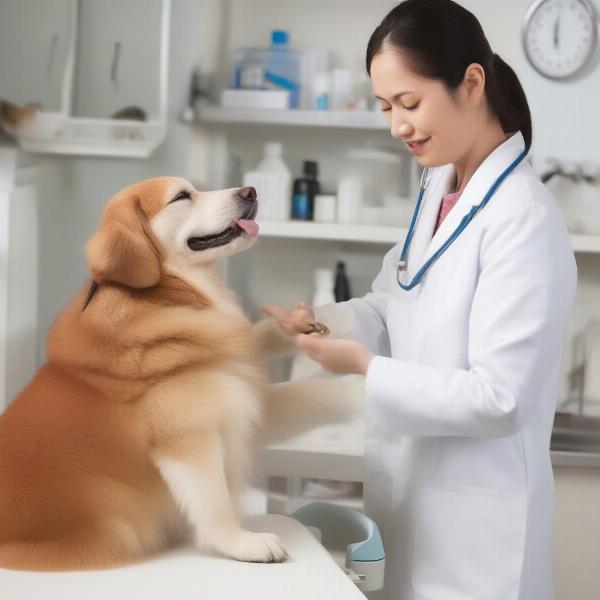Japanese mushrooms have gained popularity as health-promoting foods for humans, but what about for our canine companions? Can dogs safely consume these fungi, and do they offer any benefits? This article delves into the world of Japanese mushrooms for dogs, exploring their potential benefits, risks, and safe serving practices. We’ll cover which types are safe, how to prepare them, and what precautions you should take.
Safe Japanese Mushrooms for Dogs
While not all mushrooms are safe for dogs, several Japanese varieties can offer potential health benefits when fed in moderation. These include:
- Shiitake: Known for immune-boosting properties and supporting liver health.
- Maitake: May help regulate blood sugar and support the immune system.
- Reishi: Believed to have anti-inflammatory and antioxidant properties.
These mushrooms should always be cooked thoroughly before being offered to your dog, as raw mushrooms can be difficult to digest and may contain harmful toxins. Avoid feeding your dog wild mushrooms, as identifying safe varieties can be challenging even for experts.
Potential Benefits of Japanese Mushrooms for Dogs
Research on the benefits of Japanese mushrooms for dogs is still ongoing, but preliminary findings and anecdotal evidence suggest they may offer several advantages:
- Immune Support: Certain Japanese mushrooms contain compounds that can stimulate the immune system, potentially helping your dog fight off infections and illnesses.
- Anti-inflammatory Effects: Some mushrooms possess anti-inflammatory properties, which may be beneficial for dogs with allergies or joint issues.
- Improved Liver Function: Shiitake mushrooms, in particular, are believed to support liver health, which is essential for detoxification and overall well-being.
- Antioxidant Protection: Many mushrooms are rich in antioxidants, which can help protect cells from damage caused by free radicals.
It’s important to remember that these potential benefits are not a substitute for veterinary care. If your dog has a health condition, consult your veterinarian before incorporating Japanese mushrooms into their diet.
How to Prepare Japanese Mushrooms for Dogs
When introducing Japanese mushrooms to your dog’s diet, start with a small amount and observe for any adverse reactions. Always cook mushrooms thoroughly and avoid adding seasonings, oils, or butter, as these can be harmful to dogs. Here’s a simple way to prepare them:
- Clean the mushrooms: Wipe the mushrooms with a damp cloth to remove any dirt or debris.
- Slice or chop: Cut the mushrooms into small, bite-sized pieces to prevent choking.
- Steam or boil: Steam or boil the mushrooms until they are soft and cooked through.
- Mix with food: Add a small amount of the cooked mushrooms to your dog’s regular food.
Precautions and Potential Risks
While generally safe in moderation, some dogs may experience digestive upset after consuming mushrooms. Start with a very small amount and monitor your dog for any signs of vomiting, diarrhea, or other discomfort. If your dog experiences any adverse reactions, discontinue feeding mushrooms and consult your veterinarian. Also, avoid feeding your dog dried mushrooms as they are difficult for dogs to digest.
 Veterinarian Examining a Dog
Veterinarian Examining a Dog
Conclusion
Japanese mushrooms like shiitake, maitake, and reishi can be a healthy addition to your dog’s diet when fed responsibly. They may offer several potential benefits, including immune support, anti-inflammatory effects, and improved liver function. Always cook mushrooms thoroughly, start with small amounts, and monitor your dog for any adverse reactions. Remember to consult with your veterinarian before making any significant changes to your dog’s diet, especially if your dog has any pre-existing health conditions.
FAQ
- Can I give my dog raw Japanese mushrooms? No, always cook mushrooms thoroughly before feeding them to your dog. Raw mushrooms can be difficult to digest and may contain harmful toxins.
- What if my dog eats a wild mushroom? If your dog ingests a wild mushroom, contact your veterinarian immediately. Many wild mushrooms are toxic to dogs.
- How many Japanese mushrooms can I give my dog? Start with a very small amount and gradually increase the portion if your dog tolerates them well. Moderation is key.
- Are all mushrooms safe for dogs? No, many mushrooms are toxic to dogs. Only feed your dog varieties that are known to be safe, such as shiitake, maitake, and reishi.
- Can Japanese mushrooms cure my dog’s illness? No, Japanese mushrooms are not a substitute for veterinary care. While they may offer some health benefits, they should not be used to treat or cure any medical conditions.
- Can puppies eat Japanese mushrooms? It’s best to consult with your veterinarian before giving mushrooms to puppies, as their digestive systems are still developing.
- Where can I buy Japanese mushrooms for my dog? You can find shiitake, maitake, and reishi mushrooms at most grocery stores or Asian markets.
ILM Dog: Your Trusted Source for Canine Care
ILM Dog is your go-to resource for expert advice on dog breeds, health, training, nutrition, grooming, and much more. We offer practical, reliable information to help you provide the best possible care for your furry friend. From puppy care to senior dog support, we cover all aspects of a dog’s life. Contact us today to learn more about how we can help you and your canine companion thrive. Email: [email protected] Phone: +44 20-3965-8624. Visit us at ILM Dog.